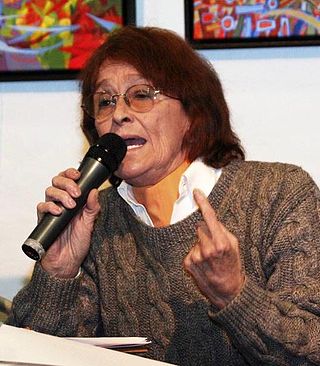Other uses
- Alzira, Valencia (Spanish: Alcira)
Alcira is a Spanish feminine given name. People with the name include:
Juan is a given name, the Spanish and Manx versions of John. The name is of Hebrew origin and has the meaning "Gift from God". It is very common in Spain and in other Spanish-speaking countries around the world and in the Philippines, and also in the Isle of Man. The name is becoming popular around the world and can be pronounced differently according that region. In Spanish, the diminutive form is Juanito, with feminine form Juana, and feminine diminutive Juanita.
Guerra is a Portuguese, Spanish and Italian term meaning "war". Notable people with the surname Guerra include:
Abelardo is a masculine given name. It is an Italian form of the name Abelard. Sometimes used as a variant of Abel.
Pas or PAZ may refer to:
Agustín is a Spanish given name and sometimes a surname. It is related to Augustín.
Juan Sánchez or Sanchez may refer to:
Flores is a Spanish surname.
Benedicto is both a given name and a surname. Notable people with the name include:
Rogelio is a masculine Spanish given name and a variant of the first name Roger. Notable people with the name include:

Alcira Susana Argumedo was an Argentine sociologist, academic and was member of the Argentine Chamber of Deputies. She was nominated as a candidate for president on the Proyecto Sur ticket for the 2011 general elections.
Germán is a male given name in Spanish speaking countries. It is a cognate to French Germain, and is a variant of Latin Germanus.
Blanco is a surname of Spanish origin, meaning "white". Notable people with the surname include:
Saavedra is a Galician surname, meaning "Old Hall", equivalent to Spanish Salavieja, which has exactly the same meaning. The loss of intervocalic L is characteristic of Galician-Portuguese. The surname Saa is also common.
Gonzalo is a Spanish masculine given name.
Alcira Cardona Torrico was a Bolivian writer and poet. She belonged to group "Gesta bárbara", which was originally founded in La Paz in 1944 with members such as Óscar Alfaro, Julio de la Vega and Armando Alba Zambrana, among others.
Casimiro is a given name. Notable people with the name include:
Alcira Soust Scaffo was an Uruguayan teacher and poet who lived in Mexico for more than two decades. During the occupation of the National Autonomous University of Mexico (UNAM) by the Mexican Army in 1968, she remained hidden for 15 days in a bathroom at the university. This episode became a notable anecdote in the Mexican Movement of 1968, and was also included in Roberto Bolaño's novels.
Mamerto is both a surname and a given name. Notable people with the name include:
Tona, Toña, Toňa and Tóna are given names. Tona is a Danish, Norwegian, Spanish and Swedish feminine given name in use in Denmark, Greenland, Sweden, Norway, Spain, parts of the United States, Mexico, Cuba, Dominican Republic, Guatemala, Honduras, El Salvador, Nicaragua, Costa Rica, Western Panama, Colombia, Venezuela, Peru, Ecuador, Bolivia, Chile, Paraguay, Argentina, Uruguay, and the Falkland Islands. The name is a short form of Antonia as well as an alternate form of Þone. Tona is also a Danish, Norwegian and Swedish feminine given name in use in Denmark, Greenland, Sweden, and Norway as a short form of Antona as well as an alternate form of Tone and Torny. Tóna is a Faroese feminine given name that is an alternate form of Tona, Tone and Torny. Toña is a Spanish feminine given name that is a short form of Antonia used in Spain, parts of the United States, Mexico, Cuba, Dominican Republic, Guatemala, Honduras, El Salvador, Nicaragua, Costa Rica, Western Panama, Colombia, Venezuela, Peru, Ecuador, Bolivia, Chile, Paraguay, Argentina, Uruguay, and the Falkland Islands. Toňa is a Czech masculine given name that is a diminutive form of Antonín used in the Czech Republic. It is also a surname. Notable people with this name include the following:
Julieta is a predominantly Spanish and Portuguese variant of the given name Julia. Notable people with this name include: